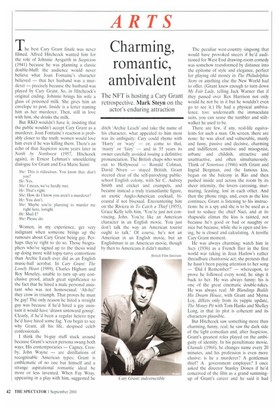T
he best Cary Grant finale was never filmed. Alfred Hitchcock wanted him for the role of Johnnie Aysgarth in Suspicion (1941) because he was planning a classic double-bluff: the audience would never believe what Joan Fontaine's character believed — that her husband was a murderer — precisely because the husband was played by Cary Grant. So, in Hitchcock's original ending, Johnnie brings his wife a glass of poisoned milk. She gives him an envelope to post. Inside is a letter naming him as her murderer. Then, still in love with him, she drinks the milk.
But RKO wouldn't have it, insisting that the public wouldn't accept Cary Grant as a murderer. Joan Fontaine's reaction is probably closer to the truth: women would love him even if he was killing them. There's an echo of that Suspicion scene years later in North by Northwest (1957, Hitchcock again), in Ernest Lehman's smouldering dialogue for Grant and Eva Marie Saint
She: This is ridiculous. You know that, don't
you?
He: Yes.
She: I mean, we've hardly met.
He: That's right.
She: How do I know you aren't a murderer?
He: You don't.
She: Maybe you're planning to murder me
right here, tonight.
He: Shall I?
She: Please do.
Women, in my experience, get very indignant when someone brings up the rumours about Cary Grant being gay. Perhaps they're right to do so. Those biographers who've signed up to the thesis wind up doing more wild topsy-turvy contortions than Archie Leach ever did as an English music-hall acrobat. In Cary Grant: The Lonely Heart (1989), Charles Higham and Roy Moseley, unable to turn up any conclusive proof, attach great significance to the fact that he hired a male personal assistant who was not homosexual. 'Ah-ha!' they crow in triumph. That proves he must be gay! The only reason he hired a straight guy was because if he'd hired a gay assistant it would have 'drawn untoward gossip'. Clearly, if he'd been a regular hetero type he'd have hired some fag. You begin to see why Grant, all his life, despised celeb confessiona Is.
I think the hi-guy stuff stuck around because Grant's screen persona swung both ways. His contemporaries — Cagney, Crosby, John Wayne — are distillations of recognisable American types; Grant is emblematic of no one but himself and a strange aspirational romantic ideal he more or less invented. When Fay Wray, appearing in a play with him, suggested he


























































 Previous page
Previous page